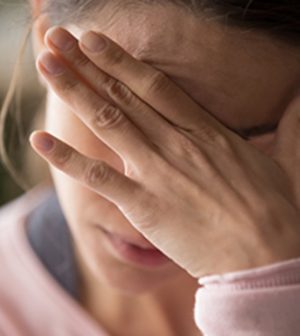- Could Your Grocery Store Meat Be Causing Recurring UTIs?
- Are You Making This Expensive Thermostat Error This Winter?
- Recognizing the Signs of Hypothyroidism
- 10 Strategies to Overcome Insomnia
- Could Artificial Sweeteners Be Aging the Brain Faster?
- Techniques for Soothing Your Nervous System
- Does the Water in Your House Smell Funny? Here’s Why
- Can a Daily Dose of Apple Cider Vinegar Actually Aid Weight Loss?
- 6 Health Beverages That Can Actually Spike Your Blood Sugar
- Treatment Options for Social Anxiety Disorder
Women’s Anxiety Rose in States Affected by Fall of Roe v. Wade

Women are suffering more anxiety and depression in states that banned abortion after the Supreme Court overturned Roe v. Wade, a new study shows.
The court’s Dobbs decision in June 2022 triggered laws banning abortion in 13 states.
In the six months after, symptoms of anxiety and depression increased among women living in those states, particularly those ages 18 to 45, researchers report Jan. 23 in the Journal of the American Medical Association.
“These findings suggest that changes in abortion policy can impact mental health at the population level,” said senior study author Matthew Eisenberg, director of the Johns Hopkins Center for Mental Health and Addiction Policy in Baltimore.
“Policymakers should, of course, be aware of the first-order impacts of policies, but studies such as this suggest that they should also consider downstream policy effects on mental health, even when a policy is not specifically targeting mental health,” Eisenberg added in a Hopkins news release.
For the study, researchers analyzed data drawn from the Household Pulse Survey, an online survey the U.S. Census Bureau conducts every two weeks to track health and socioeconomic conditions in the United States.
The survey includes a four-question screening tool often used in primary care to assess anxiety and depression, researchers said.
The study examined 13 waves of data drawn from the survey, spanning from late December 2021 to January 2023.
Nearly 719,000 people participated in survey during that period, including about 160,000 from trigger states.
Researchers found that anxiety and depression scores were nearly 9% higher in all trigger states than in non-trigger states in the six months following the decision.
In particular, scores increased 3% among women ages 18 to 45 in trigger states, but decreased by 1.8% in non-trigger states, results show.
The trigger states were Arkansas, Idaho, Kentucky, Louisiana, Mississippi, Missouri, North Dakota, Oklahoma, South Dakota, Tennessee, Texas, Utah, and Wyoming.
Researchers next plan to examine other potential impacts of Dobbs — for example, to determine whether new doctors are avoiding states where abortion is now banned or heavily restricted.
“Prior to Dobbs, research established that denial to abortion access was associated with adverse outcomes, including symptoms of anxiety,” said lead researcher Benjamin Thornburg, a doctoral student at the Johns Hopkins Bloomberg School of Public Health.
“Emerging research has suggested that a similar trend may emerge at the national level as states enact more restrictive abortion policies following Dobbs, which is precisely what our study reveals,” Thornburg added.
More information
Johns Hopkins Bloomberg School of Public Health has more on the health implications of abortion restrictions.
SOURCE: Johns Hopkins Bloomberg School of Public Health, news release, Jan. 23, 2024
Source: HealthDay
Copyright © 2026 HealthDay. All rights reserved.










